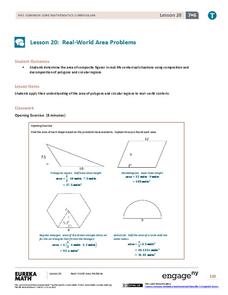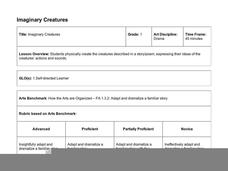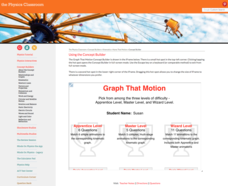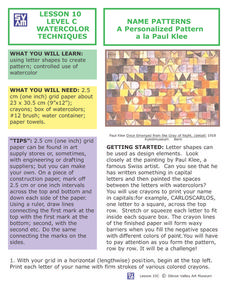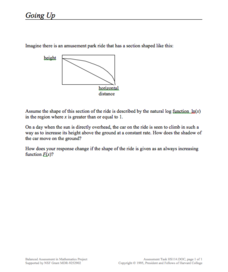EngageNY
Real-World Area Problems
Not all structures take the shape of a polygon. The 21st lesson in a series of 29 shows young mathematicians they can create polygons out of composite shapes. Once they deconstruct the structures, they find the area of the composite figure.
Curated OER
Geometric Abstraction
Students create an abstract work of art that is made by repeating geometric shapes and lines, write concise instructions to reproduce the work of art and reproduce someone else's artwork via written instructions.
TED-Ed
Different Ways of Knowing
“Words have colors, emotions, numbers, shapes, and personalities.” Daniel Tammet welcomes viewers to his world with a 10-minutes video that illustrates how he, as an autistic savant, perceives the world. Class members are then...
Curated OER
Flexible "Glass" Sculpture
Older artists create 2-dimensional surfaces with paint, then use these paintings as the components of a 3-dimensional sculpture. They assemble a free-standing sculpture that may be viewed from any angle by using wire to create the shape....
Hawaiʻi State Department of Education
Cloud Sculpting
Dance is a fantastic way to communicate thoughts, feelings, and even science concepts. Make this activity a part of your next unit on weather and clouds. Kids will discuss types of clouds, how they look, and what they do. Then, they will...
Hawaiʻi State Department of Education
Symmetrical Objects
In order to better understand how to locate a plane of symmetry in 3-dimensional objects, learners create a dance. The class reviews dance and math symmetry, then they practice making symmetrical shapes and movements with a partner....
Curated OER
Applied Science - Science and Math Lab
Students investigate topology. In this Applied Science lesson students explore higher, more abstract mathematics using tangles. Students make topologically related shapes.
Curated OER
Our Computers, Ourselves: Imagining the Digital Lives of Authors and Characters
The guiding question for this instructional activity is "Do computers and their contents shape who we are?" Open with a selection of Apple's commercials to introduce stereotypes and people's relationships with their computers. Then, read...
Hawaiʻi State Department of Education
Imaginary Creatures
Drama and movement are wonderful ways to cover story elements such as setting, character, and descriptive writing. Little ones listen to a poem about imaginary creatures. As they listen, they shape their bodies into what they think the...
American Museum of Natural History
Microbes Coloring Book and Scavenger Hunt
Coloring pages showcase microbes—bacteria, viruses, and protists. Scholars have the option to download a coloring book and scavenger hunt or color the page directly on the computer. Three paragraphs describe each microbe.
Physics Classroom
Graph That Motion
Pupils apply their knowledge of the shape and slope of graphs to interpret the motion of an object. Three levels of difficulty provide plenty of practice with support thanks to the "Help Me!" button offered with each question.
Curated OER
Name Patterns
Here is a fun, colorful, and engaging art project that is sure to get your kids excited! They make a piece of art using watercolor paints, and by making a design out of the letters of their first name. This would be a fantasti art...
Hawaiʻi State Department of Education
Pilobolus
After reviewing dance-specific terminology and watching a clip from the dance troupe Pilobolus, learners create dances of their own. They pair up and use the teacher's cues to create creature dances that exemplify mood and shape....
EngageNY
Are All Parabolas Similar?
Congruence and similarity apply to functions as well as polygons. Learners examine the effects of transformations on the shape of parabolas. They determine the transformation(s) that produce similar and congruent functions.
Concord Consortium
Going Up
Going on up—and up and up! An open-ended task asks learners to model the movement of an amusement ride with parametric equations. They then analyze their equations to determine how the shadow of the ride's car moves as it rises at a...
Curated OER
Giants of the Century
Middle and high schoolers study significant people who shaped the 20th-century history and are introduced to database tools. Researchers use the Internet to research five 20th century history makers. They write a short biography of five...
Shmoop
Coordinate Proofs
How do you know you know? Prove it! The guide goes through several examples and includes a link to a video to teach learners how to work through coordinate proofs. The goal is to prove that different shapes are indeed that shape.
Science Matters
Earthquakes and Volcanoes Pre-Assessment
See how much your class knows about earthquakes and volcanic activity and how these events shape geologic features. The first lesson in the series of 20 is a pre-test to find out what pupils already know. It includes 10 vocabulary...
Curated OER
Metals and Non-Metals
A table of the physical properties of metals and non-metals opens this high-school chemistry handout. Also covered are the chemical properties of metals and non-metals, reactivity, and fossil fuels. There are no specific questions to...
Curated OER
Chapter 12 Writing: the ABCs of Language
Providing a thorough presentation on the art of written language (and not just English), this slideshow will open your students' eyes to the sociological and linguistic issues surrounding writing systems, both modern and historical. The...
Curated OER
Introduce /h/
Explore the letter h using these strategies combining pronunciation, recognition, letter sound, and word examples. Scholars examine the letter shape and listen to you pronounce the /h/ sound. As you explain how this sound is...
Curated OER
Introduce /j/
Learn the ins and outs of the letter j using these strategies combining pronunciation, recognition, letter sound, and word examples. Scholars examine the letter shape and listen to you pronounce the /j/ sound. Use these tips to...
Curated OER
Introduce /p/
Navigate the letter p without leaving anything out: combine pronunciation, recognition, letter sound, and word examples. Scholars examine the letter shape and listen to you pronounce the /p/ sound. As you explain how this sound is made,...
Roland Park Country School
Butterfly or Moth?
What is the main difference between a moth and a butterfly? Butterflies have club-shaped antennae, while moths have a feather-like antennae. But what else differentiates these beautiful insects? The presentation in the resource...
